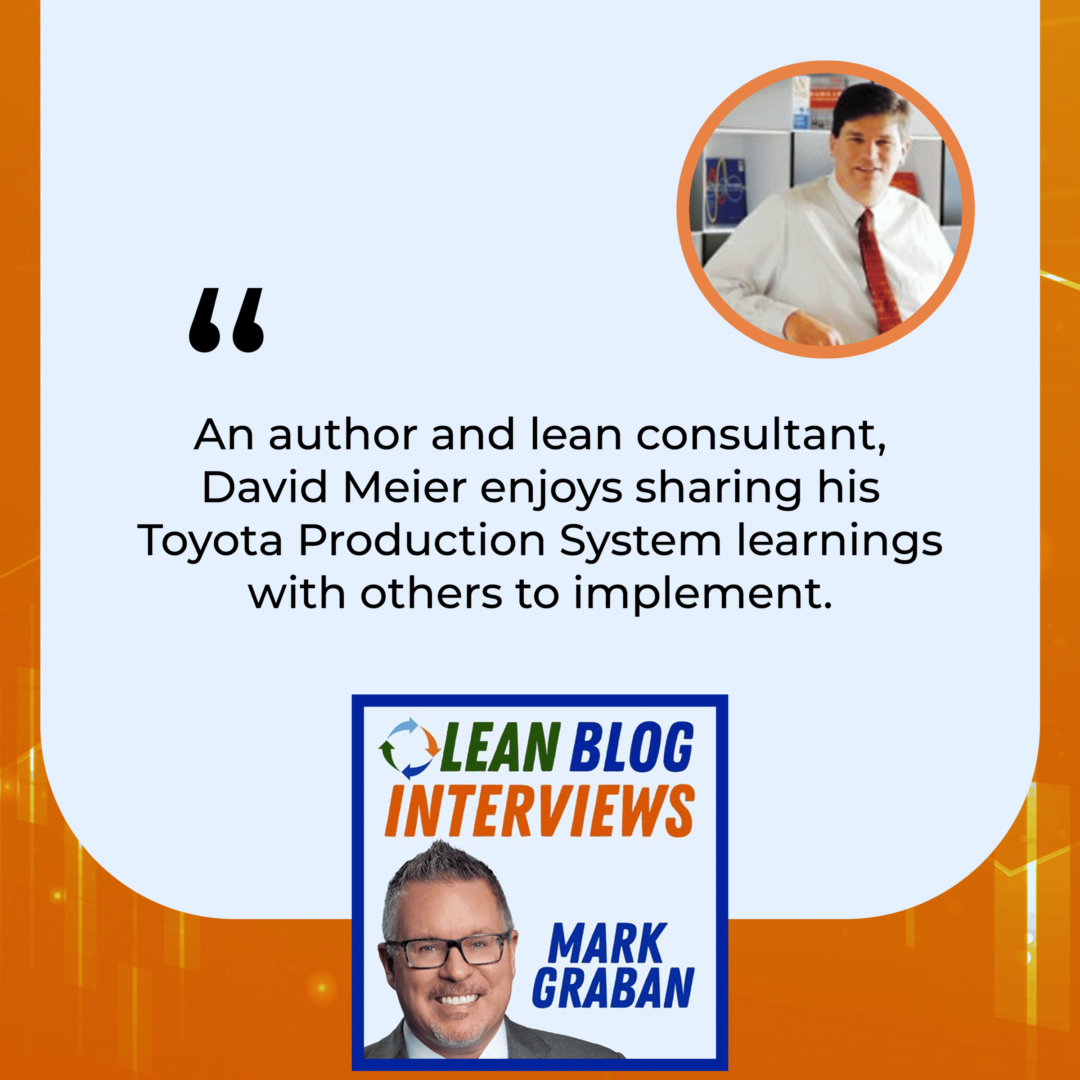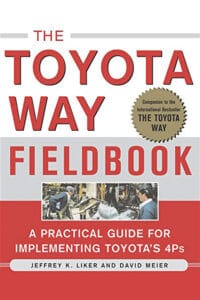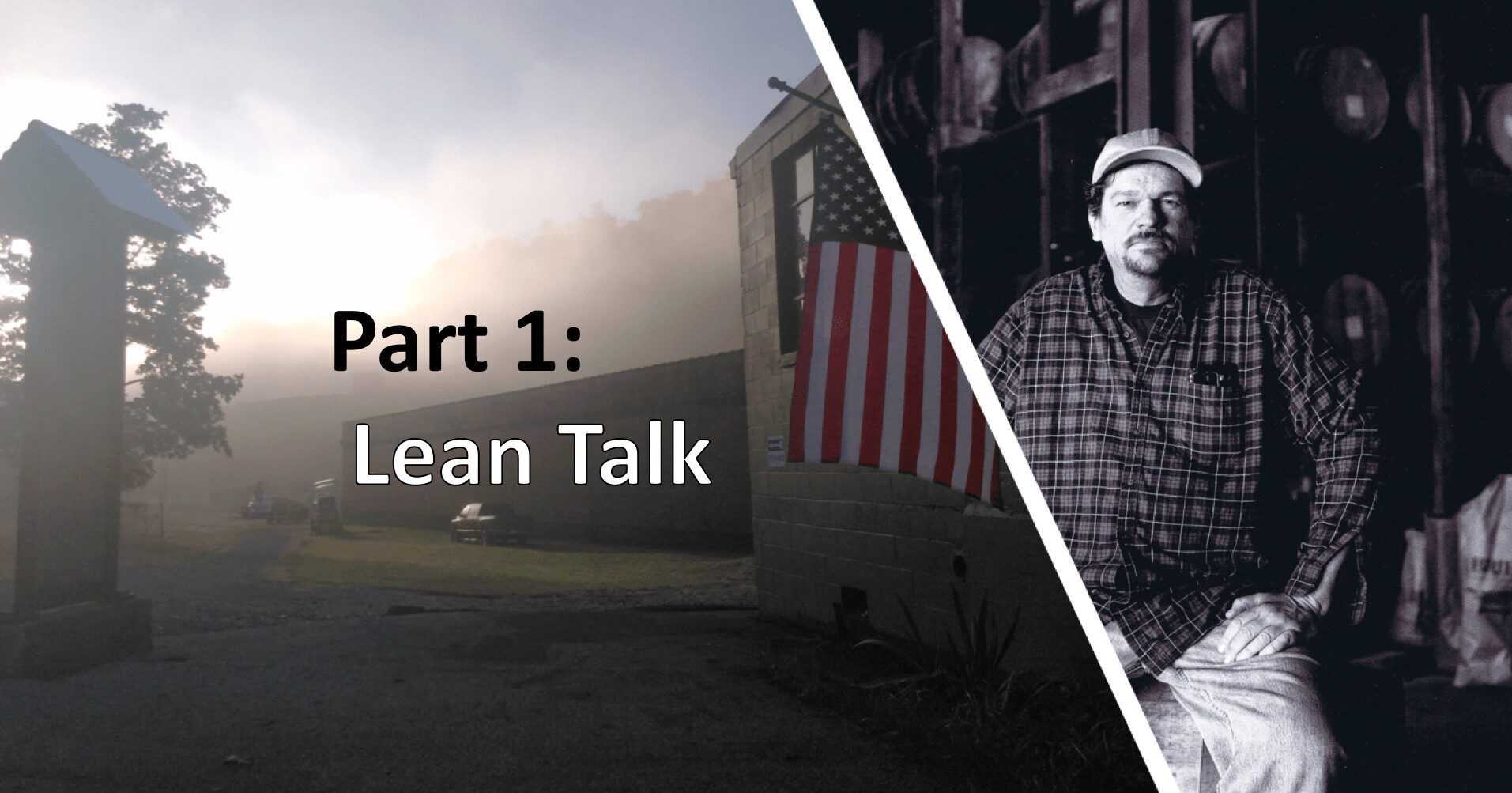Back on the podcast for the fifth time is my friend David Meier, a Lean / TPS consultant who is a former Toyota leader at their plant in Georgetown, Kentucky. He's gotten into what's, perhaps, the most Kentucky of industries… distilling bourbon (and more).
You can also listen to another, much longer episode where David and I talk about bourbon, whiskey, and continuous improvement for almost 90 minutes total there.
Today is a shorter episode, where we catch up and hear more about what David has been doing since his last podcast appearance in 2010 when we talked about the challenges Toyota was facing then.
In this episode, David drops a lot of knowledge and wisdom in a very short time — thoughts on problem solving and how Lean thinking isn't easy for anybody, even if you're Japanese.
He's co-author, with Jeff Liker, of the books The Toyota Way Fieldbook and Toyota Talent.
Topics and Links for this Episode:
- He was part of the startup crew for the Toyota Georgetown Plant in 1987
- Started working as a consultant in 1997
- The podcast with the superintendent who started with David's book
- At Toyota, you learn by doing…
- He's been trying to focus more on teaching people problem solving… why are the same types of challenges occurring just about everywhere? How were Toyota practices different? They weren't perfect, but they were better at it. “A different way of being.”
- Problems: Jumping to conclusions, bias for action… the same patterns and behaviors regardless of country and culture
- What are the common causes of these common problems? Are there common “corrective actions” that can be taken?
- Common problem: Defining the answer in the problem statement… “we lack a computer system.” A computer system is a solution… not a good problem statement.
- Toyota says to pay attention to every detail, but people want to get busy instead of studying the problem more.
- Americans say “Fire, ready, aim” and Japanese tend to say “Ready, ready, ready, ready…” They take more time, but succeed more.
- “This isn't the Japanese way… it's the Toyota Way.”
- Lean isn't easy if you're Japanese. We're all wired the same way and have similar patterns and cognitive biases that we have to work against.
- He still jumps to solutions, but has learned to not let it come out of his mouth :-)
- Seeing that an operation can be better isn't hard. Leading others to discover what better means is more difficult.
- “It was a big turning point in my career when I stopped telling people what was wrong and what they needed to do to fix it.”
- The Toyota people wouldn't give him answers. But do clients get impatient and want answers given to them?
- “What's the situation? Are you literally in crisis or is this a long-term situation that doesn't have to be fixed this week?”
- Toyota would be directive in a crisis mode… that's not about people development.
- They'd revert back to the other approach that focuses on developing people and the long term
- If that problem has been there for a year, you've survived this long, it must not be a crisis. A true crisis is relatively rare.
- Tell me how fast you need to get there and I'll give you the strategy for how to get there.
- “How much? By when? Let's clarify that first.” Clarify the timeline up front.
- With a kaizen event, you can get a lot done quickly, but people development suffers
- I learned from Toyota there's not a single way that fits all scenarios
- There's no “right” answer or “perfect solution,” just choices.
- His Toyota coaches would want to understand the thought process. Did you have a thought process that delivered a desirable result or did you get lucky?
Listen to the podcast here
David Meier, Lessons And Wisdom From Toyota

This is episode 304. It's April 9th, 2018. Back on the show for the fifth time is my friend David Meier, a Lean and Toyota Production System consultant. He is a former Toyota leader at their plant in Georgetown, Kentucky. He's gotten into what's perhaps the most Kentucky of all industries, distilling bourbon and more. In the future, I will have two episodes where David and I talk about bourbon, whiskey, other types of whiskey other than bourbon, and continuous improvement for almost 90 minutes. Those episodes are coming soon.
This is a shorter episode where David and I catch up. We hear about what he's been doing since his last appearance in 2010. There is a lot of knowledge and wisdom in this episode from David. We will talk about thoughts on problem-solving and how Lean thinking isn't easy for anybody, even if you're Japanese, because of different cognitive biases that we are all fighting when we're in the workplace. There is a lot of great stuff here. We will talk about reflections on his time when he started at Toyota in 1987. He is the co-author of The Toyota Way Fieldbook and Toyota Talent. David's past episodes were 17, 31, 35, and 85. Thanks for tuning in.
—
David, thanks for coming back and joining us on the show after a while. It's great to talk to you again. Thanks for being here.
Thank you. It's good to be here.
We're going to be catching up a little bit. Maybe for the audience who have been tuning in to the show for a long time, I'll let you reintroduce yourself to folks. We're going to have some new topics to talk about, namely the exciting world of distilling. It has been years since we've done an episode. I'm sure you've been up to a lot of exciting things since then. This might be the first time some people are knowing about you. If you want to go ahead and introduce yourself to the audience first and maybe also talk about some of the things that you've been doing.
That sounds good. To recap, I did work at Toyota in Georgetown, Kentucky. I was part of the group that started that plant in 1987. I worked there for ten years and have been doing some Lean consulting since 1997. It seems hard to believe, but back in 2005, with Jeffrey Liker, I wrote The Toyota Way Fieldbook and then a year later, I wrote Toyota Talent. It's nice still as I travel around and some companies that I see those books there. People are using those and finding those helpful in their own Lean journey.
I got to tell you about the books. Those are two of the best books in that whole series. I recorded an episode with a school district superintendent who mentioned The Toyota Way Fieldbook as one of the very first books that he read as his intro to Lean.

That's cool. As an author yourself and you're out there and trying to help folks, it's always nice to hear that the work that you've put forth has been beneficial to people and that it's helped in some way. That was the point. From '97 until 2004 when I first started working with Jeff, I had worked with organizations and seen the same sorts of difficulties over and over. It was the same challenges and the same misunderstanding maybe. That was my intent there. It was to try to address some of those things as much as possible and try to help people understand.
The things that Toyota does and the way you learn at Toyota is it's not in a classroom. It's experiential learning. You learn by doing. With all of the guys that I know who came out of Toyota, we have a similar way of thinking about things. We all had different learnings, but at that same time, it was consistent. That was 2005 when the Fieldbook came out and then 2006 on Toyota Talent.
Since then, the thing that I've been doing a lot with organizations is trying to get into the problem-solving aspect. Shortly after, the Fieldbook got a call from a pretty well-known organization that said, “We're struggling with problem-solving. We wonder if you can come in and help us.” That set me on this path of trying to understand why the same sorts of challenges were occurring in pretty much every organization I saw. I was trying to understand what were the things we did at Toyota that were different and how did those things improve our process. Certainly, we weren't perfect at it, but it was a different way of being at Toyota. I was trying to understand that and trying to help organizations down that path. It's pretty much what I've been doing since you and I have talked probably.
Is the problem-solving challenge still one of the main challenges that you're running across?
It really is. Initially, some of the things and the behaviors that I saw, I thought were particularly American in nature. It was this rush to solutions, jumping to solutions and conclusions, and bias for action. We're a fast-food society. We want everything quick. It was because of the Fieldbook that I got an opportunity to work a lot globally. I started to recognize the same sorts of things, behaviors, and patterns. Regardless of the country, company, or culture, I saw the same things. I told people, “The good news is this. If the outcome that organizations are experiencing are similar, there has to be a common cause. If we can identify the common causes, then we can put in corrective actions.”
We're a fast-food society. We want everything quick. Share on XI went back, reverse-engineered the Toyota process, and thought, “What were the corrective actions that were built into the process to try to avoid some of these fairly common mistakes that I saw repeated over and over again?” Even a simple example is defining the answer to the problem. We lack a computer system that will do X. That's not your problem. Your problem is that you lack a computer system. What is the outcome that you're getting? What is the performance of your organization? How is that performance not meeting the expectation? That's the problem. Whether the computer system is the solution or not, I don't know.
Granted, I'm working with a company here. I have to tell the teams, “It's a struggle sometimes to plow through the information, dig into it, and understand the detail.” Toyota would teach us, “You got to understand every detail.” They literally mean every detail. That's tough. We want to get busy and do something. We feel like we're not accomplishing something if we're studying it. I joked in the Fieldbook. I said that our joke at Toyota was Americans go ready, fire, and aim. The Japanese go ready, aim, and fire. It's true. They spend a lot more time on the front end of it, but in the end, everything goes quickly and succeeds typically. American guys say, “We spent 1 month planning and 11 months executing and fixing what we didn't plan for.”
Fire first and assume you hit the target, right?
Yeah. I thought, “Those are American behaviors.” I started to see them everywhere, and then I got to work with other Japanese companies that also exhibited those behaviors. The things Toyota guys had been telling started to make sense. They'd say, “This isn't Japanese. This is the Toyota way. What we do is the Toyota way.”

I didn't have a good appreciation for that until I went to Japan for the first time in 2012. I heard people there talk about the notion that the Toyota culture is not the default Japanese business culture. Not all companies there are Toyota. I hear people in the US sometimes say things like, “This would be easy if we were Japanese.” I'm like, “It doesn't sound like it's easy.” The Japanese companies and hospitals I've gone to that are trying to turn themselves around, it's not easy for them either.
It's our nature. I've come to the conclusion because I have done some studying on things like heuristics, cognitive bias, and those kinds of things. We're wired in a certain way in our brains to think in certain ways and certain patterns. You have to actively work against those things. You have to have something in place to try to minimize or redirect those. It's being human. I tell the folks I'm working with, “If I come in your operation, I cannot walk around and think, ‘They ought to try this. Maybe they should do this.'” I'm jumping to solutions. The only difference is I don't let it come out of my mouth anymore.
Our brains are wired to think in certain ways and in certain patterns. You have to actively work against those things. Share on XI've learned that that is not going to be beneficial to the conversation that they need to have to be able to go in there and say, “You need to do this over here and you need to do this over here.” I can see those things. Anybody with some Lean knowledge can go into an operation and see that it can be made better. That's not hard. The difficult thing is leading people through a process and having them discover for themselves what better means.
We get the Lean toolbox or the answer kit. This is a big turning point for me in my career. When I stopped telling people what was wrong with them and what they needed to do to fix it, I started saying, “What are you trying to accomplish? Why do you need to do that? When do you need to do that? What difference is it going to make? Let me understand your problem and then I'll show you a process to work through the problem. I'm not going to tell you an answer.” That's exactly how the Japanese guys treated us, but I didn't understand it at that time.
There's a difference. When you worked for them, you had to go along with that. As a consultant, I run across it occasionally where there is this desire for quick answers. It's a different dynamic sometimes when a client gets impatient and says, “Tell us what we need to do.” What's your response? Do you try to say, “That may be not in your best interest?” What happens?
One of the things I learned at Toyota was the first question, “What's the situation? Are you in crisis or is this what we would refer to as a long-term situation? In other words, we don't have to fix it this week.” Strategically, if you're in crisis, I might call on a Kaizen event strategy to say, “Let's take one week. Let's go in it, hit it hard, and get it done. You need it, and you need it now.” I'm going to be more directive and prescriptive.
The Toyota guys did that, too, but only in a crisis, and then they would revert back to the typical model which was to develop people. The trouble in the crisis mode is not about people development. Short-term, if it's necessary, then you take that approach. You always have to come back to the long-term approach and say, “Let's revert back to the process where we can develop people over the longer-term.” That's the first thing I try to understand with the business.

If I go into an organization and ask, “How long has this condition existed?” They're like, “It's been that way for a long time, maybe a year.” I figured, “It's not a crisis because if you've survived a year, it can't be a crisis. Therefore, if it takes us three months to get where you're trying to get, is that a reasonable expectation?”
I try to clarify that with the leadership and say, “You tell me how fast you think you need to be there and I'll tell you a strategy for how we can get there. I'm not going to give you the answer to get there. You're going to figure out the answer. There are tools. I can teach you tools and techniques. I can teach you how to analyze it and how to think about it. The ultimate answer, unless it's truly a crisis, which is fairly rare, it's more important for you guys to learn how to do that.” That is one of the key things.
At Toyota, we used to say, “How much by when? How much do you need? When do you need it?” Let's clarify that first because I don't want you to come back later and say, “This is taking a long time because we clarify the timeline upfront. You tell me when you need to be there and when you need that thing to be at that level, and then I'm going to show you an approach to get there.” We've got different strategies. There's a short-term strategy at the Kaizen event. We can hit it hard. We can hit it fast. We can get something done. The downside is little learning occurs. It's hard to do certain things in a short period of time. There are different approaches, and that's the thing I learned from Toyota. There's not one single way that fits all scenarios.
There's not one single way that fits all scenarios. Share on XIf people want to jump to solutions, they often also want that ready-made solution. That's human nature a little bit as well sometimes.
I struggled with it at Toyota. What I didn't understand as I was learning is we go through our educational system. Everywhere on the planet is the same in that there are questions and answers. There are right answers and wrong answers. Right answers get you a good grade and with wrong answers, you fail. As I was faced with these challenges at Toyota, I thought there was a right answer. It took me the longest time to understand that in reality, with the choices we face, that's exactly what we have. We have choices. There's no perfect solution. There's no ultimate answer.
The Law of Kaizen implies that something can always be made better regardless of how good it is. You never achieve a state of perfection. Therefore, it can always be better. There isn't this ultimate solution. It's more of the question of what is it we're trying to achieve and when we need to achieve it. Let's focus on closing that gap versus coming up with the ultimate answer. That's the way we're educated. We're educated that there's a right and a wrong.

I searched for the right answer over and over again. The Japanese guys would come back and ask a lot of questions, which made me feel like I was doing it wrong. It took me twenty years to realize that what they were doing was trying to understand my thought process. The only way to do that was to ask questions about what I was thinking. They would tell us that the result you got wasn't necessarily an indication that you had an effective process because you might get lucky. They wanted to know whether you have a thought process. Did you follow a process? Did that process produce a desirable result? That's what I've been doing for the last decade or so.
David has been up to a lot. He's still consulting. He bought the Old Crow Distillery. He has reopened that. He's ramping it up. He's producing bourbon and other products. It's called Glenns Creek Distilling. If you want to learn more and can't wait for the future episodes when we'll talk about what hopefully for some of you is a shared overlap in the interest of Lean, continuous improvement, and bourbon, you can go to GlennsCreekDistillery.com. I hope you look forward to those upcoming episodes. You can subscribe to the show. You can learn more by going to LeanCast.org.
Important Links
- Glenns Creek Distilling
- Episode 17 – Past Episode
- Episode 31 – Past Episode
- Episode 35 – Past Episode
- Episode 85 – Past Episode
- The Toyota Way Fieldbook
- Toyota Talent
What do you think? Please scroll down (or click) to post a comment. Or please share the post with your thoughts on LinkedIn – and follow me or connect with me there.
Did you like this post? Make sure you don't miss a post or podcast — Subscribe to get notified about posts via email daily or weekly.
Check out my latest book, The Mistakes That Make Us: Cultivating a Culture of Learning and Innovation:











